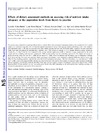Identificador persistente para citar o vincular este elemento:
https://accedacris.ulpgc.es/jspui/handle/10553/44755
| Campo DC | Valor | idioma |
|---|---|---|
| dc.contributor.author | Ribas-Barba, Lourdes | en_US |
| dc.contributor.author | Serra-Majem, Lluís | en_US |
| dc.contributor.author | Román-Viñas, Blanca | en_US |
| dc.contributor.author | Ngo, Joy | en_US |
| dc.contributor.author | García-Álvarez, Alicia | en_US |
| dc.date.accessioned | 2018-11-22T02:16:14Z | - |
| dc.date.available | 2018-11-22T02:16:14Z | - |
| dc.date.issued | 2009 | en_US |
| dc.identifier.issn | 0007-1145 | en_US |
| dc.identifier.other | WoS | - |
| dc.identifier.other | Scopus | - |
| dc.identifier.uri | https://accedacris.ulpgc.es/handle/10553/44755 | - |
| dc.description.abstract | The present study evaluated how applying different dietary methods affects risk assessment of inadequate intakes at the population level. A pooled analysis was conducted using data from two Spanish regional representative surveys both applying similar methodology with a total sample of 2615 individuals aged 12-80. Diet was assessed in the entire sample applying data from one 24 h recall (24HR), a mean of two non-consecutive 24HR, both crude and adjusted for intraindividual variability, and a FFQ. Intakes of vitamins A, C, E, thiamin, riboflavin, niacin, vitamin B-6, vitamin B-12, Fe, Mg, P and Zn were compared to the average nutrient requirement (ANR or estimated average requirement) in the entire sample and also excluding under-reporters applying the ANR cut-point method (and the probability approach for Fe). Higher percentages of intakes below the ANR were seen for 1-24HR and the mean of 2-24HR, except for nutrients with the highest rates of inadequacy (vitamins A, E, folate and Mg). For these micronutrients, higher percentages of inadequacy were obtained by adjusted 24HR data and the lowest with FFQ. For the remaining nutrients, adjusted data gave the lowest inadequacy percentages. The best concordance was seen between 2-24HR and 1-24HR as well as for adjusted 24HR, with the least observed between FFQ and the other methods. Exclusion of under-reporters considerably reduced inadequacy in both daily methods and FFQ. Crude daily data gave higher estimates of inadequate intakes than adjusted data or FFQ. Reproducibility of daily methods was also reasonably good. Results may differ depending on the micronutrient thus impeding reaching conclusions/recommendations common for all micronutrients. | en_US |
| dc.language | eng | en_US |
| dc.relation.ispartof | British Journal of Nutrition | en_US |
| dc.source | British Journal of Nutrition [ISSN 0007-1145], v. 101 (sup. 2), p. S64-S72, (Julio 2009) | en_US |
| dc.subject | 3206 Ciencias de la nutrición | en_US |
| dc.subject.other | Dietary methods | en_US |
| dc.subject.other | Nutrition assessment | en_US |
| dc.subject.other | Nutrient adequacy | en_US |
| dc.subject.other | Dietary surveys | en_US |
| dc.subject.other | 24 h recall | en_US |
| dc.title | Effects of dietary assessment methods on assessing risk of nutrient intake adequacy at the population level: from theory to practice | en_US |
| dc.type | info:eu-repo/semantics/article | en_US |
| dc.type | Article | en_US |
| dc.identifier.doi | 10.1017/S0007114509990596 | en_US |
| dc.identifier.scopus | 2-s2.0-70149105282 | - |
| dc.identifier.scopus | 70149105282 | - |
| dc.identifier.isi | 000268650500009 | - |
| dc.contributor.authorscopusid | 6602967291 | - |
| dc.contributor.authorscopusid | 35596972100 | - |
| dc.contributor.authorscopusid | 6508195983 | - |
| dc.contributor.authorscopusid | 7004471656 | - |
| dc.contributor.authorscopusid | 22978835400 | - |
| dc.identifier.eissn | 1475-2662 | - |
| dc.description.lastpage | S72 | en_US |
| dc.identifier.issue | SUPPL. 2 | - |
| dc.description.firstpage | S64 | en_US |
| dc.relation.volume | 101 | en_US |
| dc.investigacion | Ciencias de la Salud | en_US |
| dc.type2 | Artículo | en_US |
| dc.contributor.daisngid | 1002891 | - |
| dc.contributor.daisngid | 28836 | - |
| dc.contributor.daisngid | 1559866 | - |
| dc.contributor.daisngid | 1165987 | - |
| dc.contributor.daisngid | 2673309 | - |
| dc.description.numberofpages | 9 | en_US |
| dc.utils.revision | Sí | en_US |
| dc.contributor.wosstandard | WOS:Ribas-Barba, L | - |
| dc.contributor.wosstandard | WOS:Serra-Majem, L | - |
| dc.contributor.wosstandard | WOS:Roman-Vinas, B | - |
| dc.contributor.wosstandard | WOS:Ngo, J | - |
| dc.contributor.wosstandard | WOS:Garcia-Alvarez, A | - |
| dc.date.coverdate | Julio 2009 | en_US |
| dc.identifier.supplement | 2 | - |
| dc.identifier.ulpgc | Sí | es |
| dc.description.jcr | 3,446 | |
| dc.description.jcrq | Q1 | |
| dc.description.scie | SCIE | |
| item.fulltext | Con texto completo | - |
| item.grantfulltext | open | - |
| crisitem.author.dept | GIR IUIBS: Nutrición | - |
| crisitem.author.dept | IU de Investigaciones Biomédicas y Sanitarias | - |
| crisitem.author.dept | Departamento de Ciencias Clínicas | - |
| crisitem.author.orcid | 0000-0002-9658-9061 | - |
| crisitem.author.parentorg | IU de Investigaciones Biomédicas y Sanitarias | - |
| crisitem.author.fullName | Serra Majem, Luis | - |
| Colección: | Artículos | |
Citas SCOPUSTM
30
actualizado el 08-jun-2025
Citas de WEB OF SCIENCETM
Citations
30
actualizado el 12-ene-2026
Visitas
189
actualizado el 15-ene-2026
Descargas
185
actualizado el 15-ene-2026
Google ScholarTM
Verifica
Altmetric
Comparte
Exporta metadatos
Los elementos en ULPGC accedaCRIS están protegidos por derechos de autor con todos los derechos reservados, a menos que se indique lo contrario.
